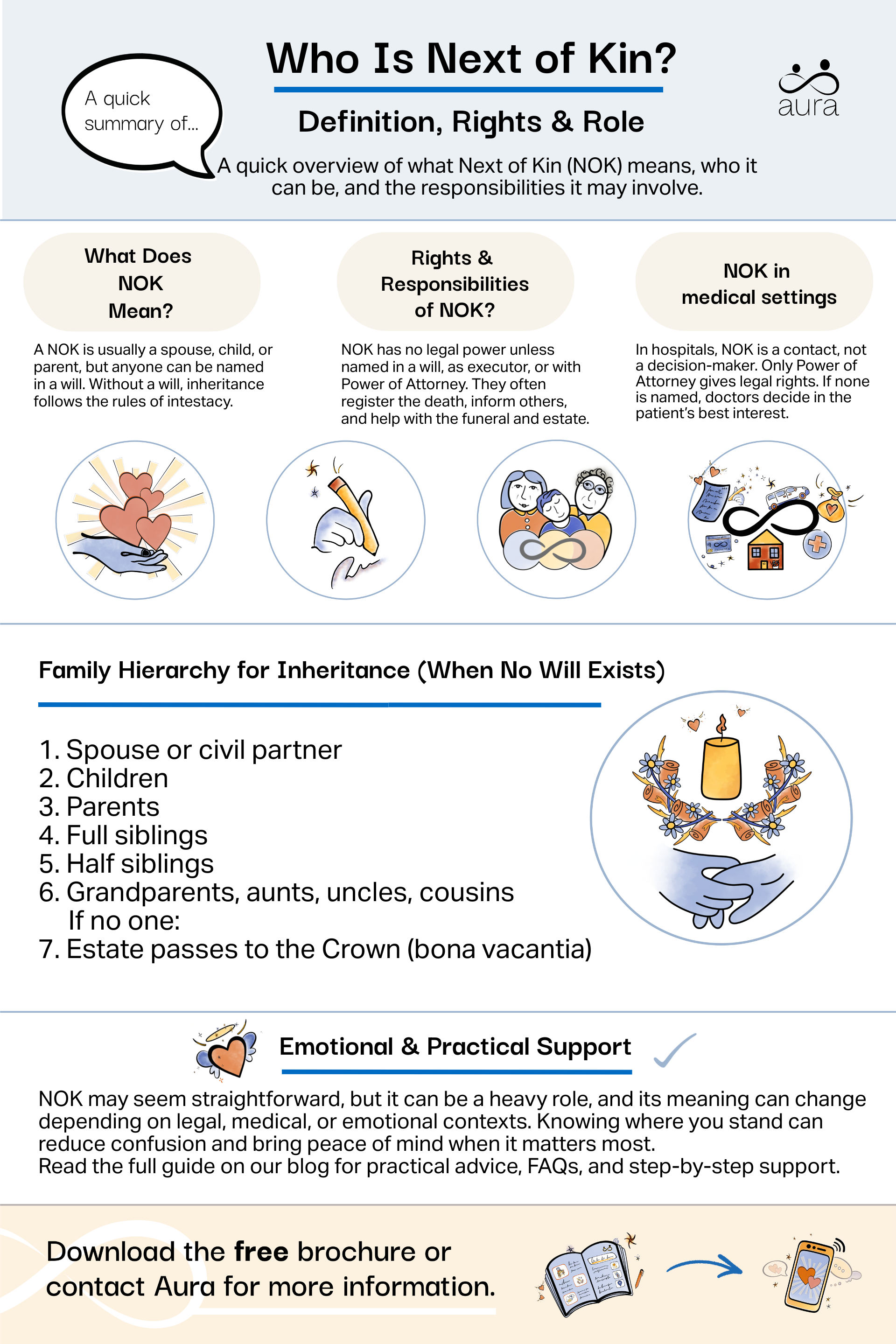


Written by Emily Cross.
19 minute read

At a time when a loved one has died, or when they are approaching the end of their life, there could understandably be a wide range of challenging emotions you’re experiencing. We all grieve in our own time and in our own way, but for those closest to the person who has died, the emotional weight often feels especially heavy.
One of the reasons for this is that the person who is next of kin will potentially have a series of obligations they have to fulfill. Disputes, uncertainty, or simply a lack of information about who the next of kin is and what they need to do can add worry and upset at a time that may already be very challenging.
Here at Aura, we want to provide support in any way we can. We have created detailed guides on things such as what to do when a loved one dies and next of kin and funeral costs, and now we are turning our attention to identifying who in the family is the next of kin.
We hope it goes some way to giving you the help, support, and clarification that can make a difference at times like these.
Key takeaways:

The general meaning of “next of kin” is the person who is closest to a loved one. This could be the wife, husband, or civil partner. In the absence of a legally recognised relationship and a will, the next of kin would then be an adult child or surviving parent, followed by any adult siblings.
There are also legal nuances surrounding the term, which can complicate matters if you’re not aware of them. Legally, a person can name anyone as their next of kin in their will whether they are a blood relative or not. This person would then stand to inherit the estate left behind.
Next of kin can sometimes be named in a medical setting, but it’s important to understand what that really means. Hospitals often ask for a next of kin so they have someone to update or speak to about their loved one’s condition. This person might also help the team understand the patient’s wishes, but they have no legal right to make decisions about care unless they hold Lasting Power of Attorney for Health and Welfare (LPA) —a legal document that gives someone the authority to make medical and personal care decisions on another person’s behalf if they’re no longer able to do so themselves.
If no next of kin is named, that’s also fine. Hospitals are not legally required to have one and will still act in the person’s best interests using clinical judgement and, where possible, the views of those close to the person.
It’s also worth knowing that being named as a next of kin in this way does not give someone the right to inherit anything from the person. That’s an entirely separate process handled by the rules of a will or intestacy.
Anyone can be your next of kin…it doesn’t have to be a blood relative. In most cases, people choose a close family member like a spouse, parent, or child. But if you don’t have family, or aren’t in contact with them, you can name a close friend or partner instead. There’s no legal process for choosing a next of kin, and no official paperwork is needed unless it’s for something specific like hospital records or housing forms. The most important thing is that the person you name is someone you trust to represent you or be contacted if something happens.
The typical order of next of kin follows a family line of spouse, children, parents, and siblings. After this point, there are grandparents, aunts, and uncles, followed by cousins. Couples who are not married but are in a long-term relationship may wish to nominate one another as their next of kin in their respective wills. This is because, although they are in a loving relationship that may have extended over many years, even decades, it is not legally recognised and may be overruled by the family hierarchy previously outlined.
If no next of kin can be identified or contacted, the person is treated in a similar way as dying intestate (without a will), and their estate passes to the Crown under a process known as ‘bona vacantia’. The estate is then managed by the Government Legal Department, which is responsible for dealing with unclaimed property on behalf of the Crown.
You have the right to choose your next of kin in any way you see fit, and you can name them in your will. Although many people choose their next of kin based on marriage, civil partnership, or blood relations, there is no expectation that you will do so. The next of kin can be anyone you feel comfortable with and close to, and naming them is something that you have discretion over.
You also have the option of naming someone as next of kin who will have full legal authority over you if you were to lose mental capacity. This requires the two of you to set up power of attorney and will allow your next of kin to make decisions on your behalf, covering things such as your financial arrangements and any ongoing or future medical care.
It is important to note that you cannot designate yourself as the next of kin for a loved one, even if you are in a longstanding common-law relationship.

To help provide support when you feel ready, we have outlined the rights and responsibilities you have so that you can refer back to them as and when you need to:
Legal rights of next of kin
The next of kin is not a legally defined term in the UK and as such does not automatically grant you legal rights, powers, or responsibilities. One of the confusing aspects of the term is that it has evolved over centuries to have a variety of different yet partially overlapping meanings.
The original meaning was simply the closest living relative. Understandably, this would be the person who was typically consulted regarding medical decisions. They would know the person in question and be able to inform doctors of their wishes if they were unable to speak on their own.
Inheritance rights will be dictated by who is named as the next of kin in the will, or by the rules of intestacy if no will is left. The next of kin in the will can be anyone the person who has died chooses and therefore may not be the person a doctor would view as closest to their patient. Lasting power of attorney, or a parent or guardian if the person in question is a child, will also trump the next of kin. We understand that this may be complicated and confusing at a time when you simply want to take care of a loved one.
Medical settings will typically require someone close to the loved one whom the doctors and nurses can liaise with. They are not making decisions, but rather serving as a point of contact and a sounding board so that the medical professionals can understand what the patient’s wishes may be.
Although the next of kin will be consulted, this is not the same as them being able to determine the course of action that will be taken. For this to happen, the next of kin will also need to have lasting power of attorney — a designated legal status that gives them a clear set of rights and responsibilities.
When a loved one dies, the next of kin will typically be responsible for registering a death and obtaining the death certification from a doctor. Doing so may require you to familiarise yourself with 2024 changes to death registration in the UK. It’s important to note that a death generally needs to be registered at the registrar’s office within 5 days in the UK, and 8 days in Scotland.
The next of kin will also take on responsibility for informing family friends, employers, and others who need to be made aware. One case that is easy to overlook given the circumstances is to notify banks and building societies of the death. If you are faced with having to do this but are not sure why it is important, we have created a short guide on what happens to bank accounts when you die that may prove useful at this time. The government’s Tell Us Once service can also help reduce the administrative load at what is already a difficult time.
While being next of kin doesn’t automatically make you legally responsible for organising the funeral, in many cases, the next of kin does end up arranging it and handling the estate. The estate, in particular, may prove time-consuming or feel challenging when you want to focus on processing your loss and dealing with the unexpected death of a loved one.
Breaking it up into smaller steps may help support you:
A will names the next of kin and can greatly reduce the pressure and uncertainty experienced by those left behind after the death of a loved one. However, if there is a death without a will, the laws of intestacy determine who is the next of kin for inheritance purposes.
Here is a comprehensive outline of the hierarchy involved, starting at the top:
In the unfortunate event that no surviving relatives are identified and found, the estate passes to the Crown and no one will inherit what the loved one has left behind. While the Crown will execute the will, they are not typically regarded as the next of kin and the law will consider no next of kin as having been found. This highlights an important distinction between the next of kin and the executor of a will.
The executor is the person named in the will and has legal authority to handle the affairs of the person who has died. They are legally responsible for carrying out their wishes in a timely manner. Although the next of kin will traditionally organise and oversee the funeral arrangements, they have no legal authority over how the estate is managed unless stated otherwise in the will. It may also be useful to know that to legally act as an executor of a will, you have to apply for letters of probate before you can begin work.
The next of kin plays an important role in terms of inheritance, settling the finances of the estate, and communicating with medical professionals. Although it is a role that has several meanings and no clear legal definition, it is still of paramount importance.
Medical professionals need to identify next of kin so that they can communicate with the family and coordinate care when the patient is unable to speak on their own behalf. Providing updates or changes to their care, arranging times to discharge them, and talking through practical matters are all important.
While the next of kin does not automatically have decision-making powers, many choose to apply for lasting power of attorney when a loved one is unable to care for themselves. This can prove particularly important in cases where end-of-life care decisions need to be made during what can be lengthy and emotionally challenging discussions with medical professionals.
In the absence of a will, it’s general practice for the next of kin to apply to become the administrator of the estate. This allows them to handle probate and redistribute the money and valuables that form the estate. The next of kin may also find that they naturally become the point of contact for banks, government departments, and other organisations and institutions who need to be contacted after the death of a loved one.
While a death in the family can be a challenging and upsetting time, failing to identify the next of kin can cause significant delays to probate and inheritance claims. Identifying the next of kin and then taking the appropriate legal steps that allow them to act may feel at odds with the grieving process for some, but it is also an important part of settling affairs and potentially achieving some degree or form of closure. During this time, questions like “how much does a funeral cost?” often arise—adding financial pressure to an already potentially emotional period, especially when no arrangements were made in advance.
We all grieve in our own way and it is natural for emotions to come out in different ways when a loved one dies. This is one of the reasons why many professionals will say that everyone should be aware of the importance of writing a will while they are still of sound mind.
Keeping everyone up to date and informed can be challenging at the best of times, and more so when you are dealing with your own grief. While a will never makes things easy, it can help to avoid some of those potentially awkward or difficult conversations that may naturally occur when the person’s wishes aren’t clearly known.
We may have covered these points in passing already, but because of their importance, we wish to highlight them here for clarity:
Being the next of kin may feel like an extra weight of responsibility at what is already a difficult time. For this reason, you may find it helpful to make use of the Sue Ryder grief support service or to potentially consider applying for compassionate funeral leave if you are facing difficulty at work.
Others find that understanding end-of-life stages before their loved one dies can help manage the stress of being the next of kin. You may also find that thinking through how you will go about
announcing a death to friends can help you come to terms with your loss and reflect on what your loved one meant to you.
Finding ways to work through your grief and come to terms with the fact that a loved one has died is a deeply personal journey. We all do it in our own way — some preferring to stay busy, others prioritising time out — and there is no right or wrong way to do it.
As a family-run funeral provider with a passion for making a difference, we know from experience that being open and accommodating at all times can make a difference. We are always here to discuss prepaid funeral plans if you are making plans for your own future, as well as direct cremation for a loved one who has recently died.
Our approach is always to provide you with options that you can then tailor and personalise so that they reflect what you want. We’re also always available to provide support and hope that this guide plays its own small part in helping you through what may be a difficult time in your life.



If you have any questions, would like a brochure or simply would like a chat through our services, our award-winning team is here to help.
Unlike other providers, we won’t hassle you with constant calls. We’ll simply ensure you have the information you need and leave you to come to a decision in your own time. When you’re ready for us, our team will be ready to help.
One of the main causes of stress or confusion around the issue of the next of kin is that there is no strict legal definition. Generally speaking, ‘next of kin’ refers to the closest surviving relative of the loved one in question. This could be the spouse or their civil partner, a parent, or an adult child. There is also the option for your loved one to name anyone else they wish as their next of kin, even if they are not a blood relative.
Because there is no strict legal definition in the UK, being named the next of kin does not automatically confer legal powers of decision-making. This requires additional steps, such as applying for and being granted power of attorney.
If the next of kin is named as such in the will of the person who has died, they will inherit the estate as outlined in the will. However, if there is no will at the time of death, the rules of intestacy take over and determine who will inherit the estate. In this case, the next of kin will not automatically inherit the estate, and the estate may be divided up between multiple family members according to how ‘close’ they are in relation to the person who has died.
Proof of a legal relationship with the person who has died will typically be required to fully establish next of kin status. Examples of documentation that may be used to achieve this are birth certificates, adoption papers, and marriage certificates. However, if you are named in your loved one’s will as the next of kin, no other form of proof is required, and you will automatically be granted next of kin status.
A common-law partner is an everyday term for a couple that lives together, but it is not something that is recognised by the British legal system. If the common-law partner is not listed as the next of kin in the dead person’s will, they may find that they do not have the rights to inheritance or the level of legal authority that they expect. In some cases, this may lead to stressful and time-consuming disputes with the blood relatives of their loved one.
In the absence of a lasting power of attorney, trained health professionals will make medical decisions on behalf of someone who is of reduced mental capacity. A key part of their decision-making process will involve consultations with the family so that they can gain a clearer understanding of the wishes of the person they are treating. In the event that no one is willing or able to speak on behalf of the person being treated, the court may decide to appoint a deputy who will speak on their behalf.
One of the difficult things to consider when speaking about next of kin status is that there are several different contexts in which it may mean different things. One such example is within the context of intestacy, in which, by definition, the next of kin is the person who is legally entitled to inherit when there is no will.
By means of example, this is different from the next of kin who would be nominated to speak on behalf of someone of reduced mental capacity within a healthcare setting. This medical definition of the next of kin does not grant any rights of inheritance to the person holding that status.
No, a legally binding will that has been properly executed will, generally speaking, override someone who has been named as the next of kin in another context. The British legal system is set up to recognise the will as the final word of the person who has died about how they want their affairs to be handled and their estate redistributed.
There are cases where no one can be found who would be a suitable next of kin. In these instances, the estate of the person who has died follows a process of bona vacantia — Latin for “vacant goods” — that acts to return the estate to the Crown. The Treasury Solicitor will then act on the Crown’s behalf and will set about administering the estate in line with legal precedent.
staging site last replicated: MISSINGNO.